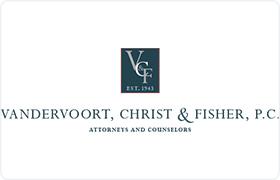Middleville Divorce & Family Law Lawyer, Michigan
Sponsored Law Firm
-
 x
x

Click For More Info:
-
Vandervoort, Christ & Fisher, P.C.
70 Michigan Avenue W. Suite 450 Battle Creek, MI 49017» view mapDivorce & Family Law Personal Service You Can Rely On
Our attorneys work closely with clients to understand their objectives, explain the law, return their calls promptly and keep them informed about the status of their case.
800-743-9850
Bruce W. Gee
Public Finance, Child Support, Adoption, Banking & Finance, Business & Trade
Status: In Good Standing Licensed: 51 Years
Carol Jones Dwyer
Other, Government, Family Law, Consumer Bankruptcy
Status: In Good Standing Licensed: 44 Years
Christine L. Schofield Mills
Lawsuit & Dispute, Wrongful Termination, Divorce & Family Law, Criminal
Status: In Good Standing Licensed: 33 Years
David W. Clagett
Construction, Wills & Probate, Family Law, Car Accident
Status: In Good Standing Licensed: 31 Years
Dennis R. Cooper
Federal Appellate Practice, Trusts, Divorce & Family Law, Business
Status: In Good Standing
Elizabeth Joan Cook
Federal Appellate Practice, Family Law, Native People
Status: In Good Standing Licensed: 14 Years
Frank G. Hillary
Family Law, Divorce & Family Law, Criminal
Status: In Good Standing Licensed: 31 Years
Jackie Lynn Baker
Real Estate, Estate Planning, Family Law, Criminal
Status: In Good Standing Licensed: 12 Years
Jan M. Otto
Federal Appellate Practice, Family Law, Criminal, Children's Rights
Status: In Good Standing Licensed: 18 Years
 Matthew X. Hauser Battle Creek, MI
Matthew X. Hauser Battle Creek, MI Practice AreasExpertise
Practice AreasExpertise
